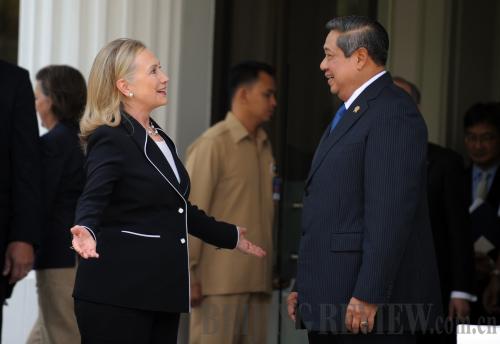|
 |
|
Author Jiang Zhida |
The 21st ASEAN Summit and related events will be held in Phnom Penh, the capital city of Cambodia, in mid-November. All 10 ASEAN member states and their partners will discuss regional and international issues in a series of meetings. As the largest member state of ASEAN, Indonesia's foreign policy is expected to play a key role in the summits.
Since Indonesian President Susilo Bambang Yudhoyono assumed his second presidency in 2009, Indonesia's diplomatic weight has increased as the country exhibits more confidence and ambition than ever before. Indonesia projects a multi-directional diplomacy on the basis of its independent foreign policy to pursue greater power in the international arena. While the global economic recession continues and Europe's debt crisis worsens, Indonesia's assertive diplomacy has put it under the spotlight of international affairs.
Leading the ASEAN pack
 |
|
BILATERAL DIPLOMACY: Indonesian President Susilo Bambang Yudhoyono meets with U.S. Secretary of State Hillary Clinton in Jakarta on September 4 (XINHUA) |
Since the resignation of President Suharto in 1998, the Indonesian Government has sought to strengthen its relationship with ASEAN. Thanks to the efforts of presidents Abdurrahman Wahid and Megawati Sukarnoputri, the country has gradually recovered its influence in ASEAN.
At the 36th ASEAN Ministerial Meeting in June 2003, Indonesia put forward a long-term plan on the establishment of an ASEAN Community by 2020. At the Ninth ASEAN Summit four months later, ASEAN leaders resolved to establish an ASEAN Community comprised of three pillars—political and security cooperation, economic cooperation, and socio-cultural cooperation.
Yudhoyono first became president of Indonesia in 2004, at a time when Singapore, Malaysia and the Philippines were hoping for Indonesia's positive response on a series of regional issues, including securing the Strait of Malacca and working together to combat terrorism. In this context, Indonesia pivoted to ASEAN, strengthened its relations with neighboring countries and obtained their trust.
In 2011 when Indonesia held the rotating ASEAN chair, it played a positive leading role in helping address international disputes in the region, such as the territorial dispute between Thailand and Cambodia.
Building partnerships
Indonesia has made notable achievements in developing relations with major powers. Currently, it has established strategic partnerships with China, the United States, India, Japan and Australia. It will also forge a strategic partnership with the EU soon. These partnerships give Indonesia greater room for maneuvering and provide a solid foundation from which to play a bigger role in international affairs.
In 1997, when Indonesia and other Southeast Asian countries were hit by a serious financial crisis, China offered aid to help Indonesia climb out of its economic crisis. Since then, the Indonesian Government has regarded China as an important partner in its economic recovery. In 2005, China and Indonesia declared that the two countries formed a strategic partnership and began comprehensive cooperation.
In the framework of the China-ASEAN Free Trade Area, Sino-Indonesian trade has enjoyed an annual increase of 10 percent in recent years, exceeding $60 billion in 2011. Today, China has become the largest source of imports (excluding oil and gas) and second largest export market for Indonesia. Leaders of both China and Indonesia have vowed to achieve in advance the planned 2015 goal for bilateral trade to hit $80 billion. Susilo paid a state visit to China in March 2012. During the visit, the two sides signed 15 cooperation agreements, which exceeded $17.5 billion and focused on infrastructure and industry investment.
Furthermore, China has long maintained cooperation with Indonesia on international and regional issues. The two sides share a common view on regional security. Indonesia consistently adheres to maintaining peace and stability in the South China Sea and the Asia-Pacific region, and agrees with China on resolving South China Sea disputes through bilateral channels. Indonesia is willing to mediate these disputes, to the expectation of other ASEAN member states. Thus, the country could play a constructive role in South China Sea issues.
Indonesia is the only Southeast Asian member of the Group of 20 (G20) major economies. It has vowed to make positive contributions to global governance as a representative for other Southeast Asian countries and developing nations. At G20 summits, Susilo put forward a number of proposals in support of developing countries.
China and Indonesia share the same views on many global issues, including financial reform, climate change, environmental protection and energy development. As the largest Muslim country by population, Indonesia advocates a peaceful settlement on the Iranian nuclear issue and Middle East conflicts, and proposes eliminating the root of terrorism through poverty reduction. These stances are generally shared by China.
| 